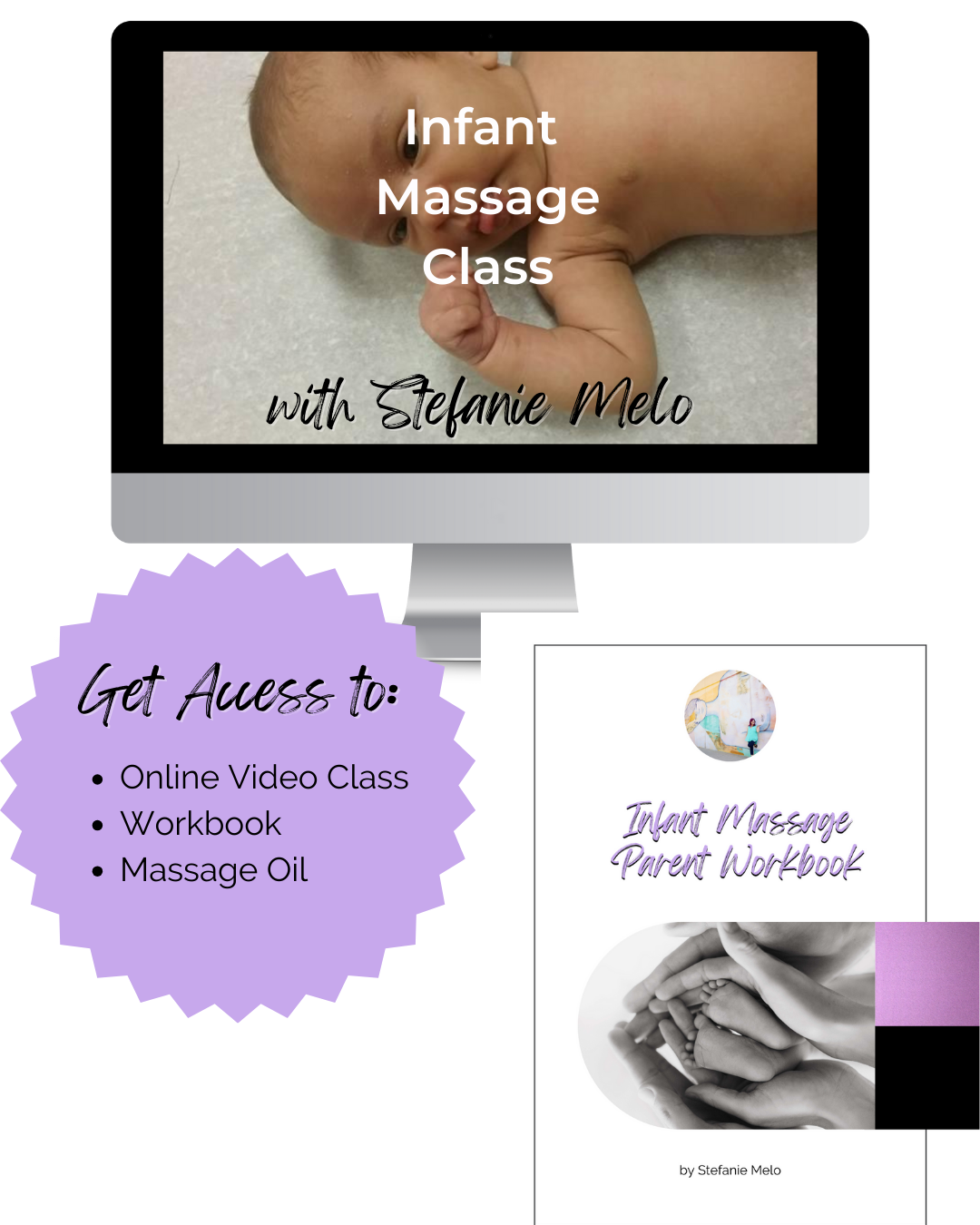
This is how you can think about pregnancy spacing so that you can reduce risks to you and your baby, enjoy sex when you want it and improve your mental health so you really enjoy your motherhood experience and that precious little one you’re nurturing.
When we talk about pregnancy spacing, we’re referring to
- END of one Pregnancy to the
- START of the next pregnancy.
I spent a decade bringing my babies into the world. I gave birth in December 2011, October 2013, August, 2015, December 2017, Loss in November 2018 and November 2019.
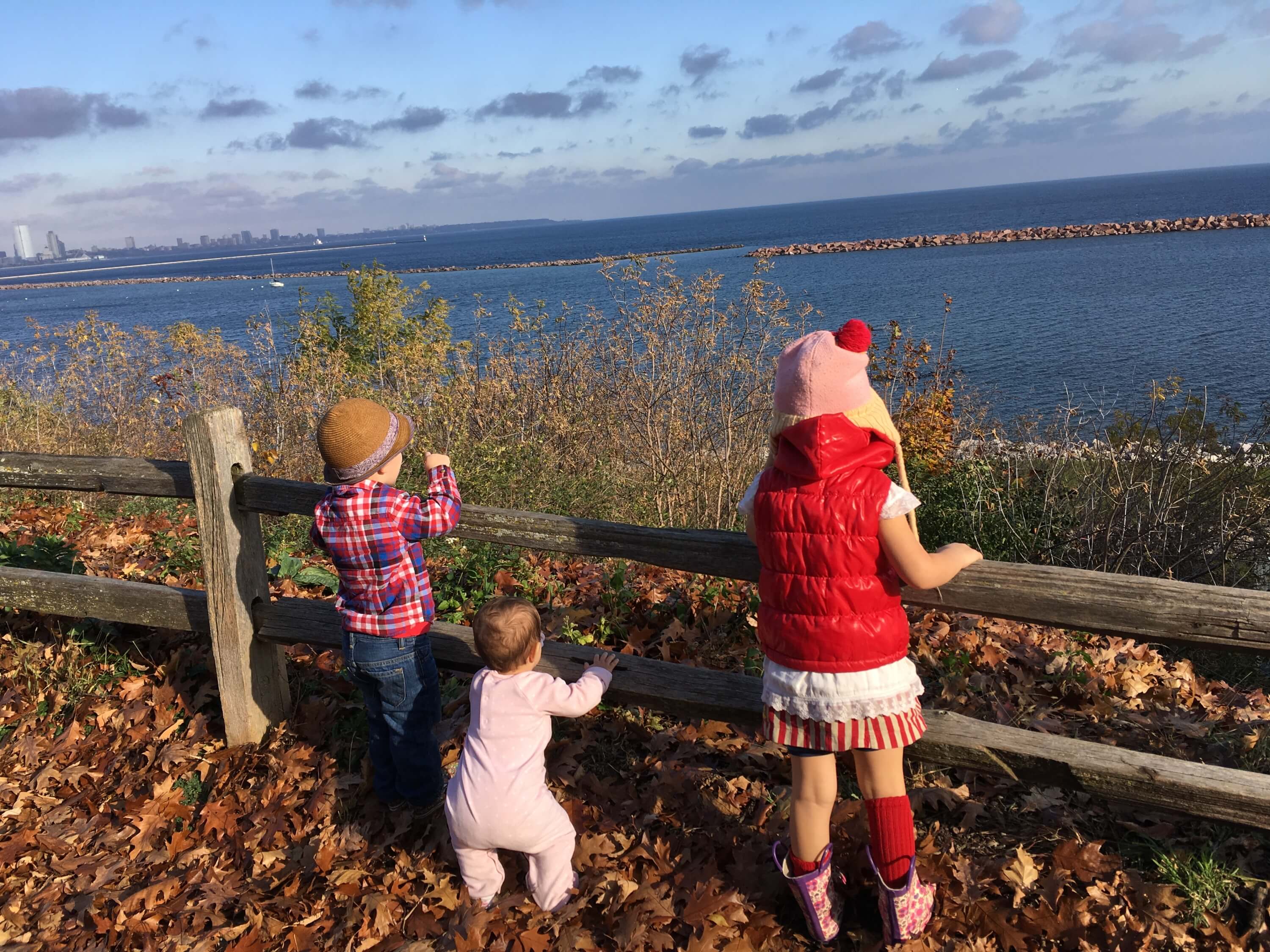
My spacings were 13 months, 13 months, 17 months, 9 months and 3 months (after miscarriage).
Why My Pregnancies Were So Close
I personally always wanted 4 kids and I didn’t get married until I was 30, so I didn’t see myself as having a big window or unlimited fertility. That might be different than your story, so don’t think I’m advocating for that. Just under two years is common for a lot of families, there isn't judgement here. However, if you are planning with intention there are GOOD, GOOD reasons to space 18 months or more.
Why I Don't Recommend the Same for Others
It wasn't until I a tooth cracked when my second child was 14 months old I realized I was becoming nutritionally depleted. Before going to the dentist, I took a pregnancy test and SURPRISE--I was about 7 weeks pregnant.
But further, my postpartum anxiety was also impacted by this depletion. Anti-anxiety or depression medication is fine–but these were multi-faceted experiences that my depletion was a big piece of.
For me, PPA came out like rage, so I didn’t know what the heck was wrong with me for a long time. My stress response was directly impacted by low vitamin d, low vitamin b and of course interrupted sleep.
According to ACOG:
"The most benefits come from waiting at least 18 months to get pregnant again. Waiting this long gives your body enough time to recover. It also lowers your chances of complications in your next pregnancy, including gestational diabetes, preterm birth, and low birth weight."
So let’s talk about some of this:
VBAC -
Vaginal birth after cesarean is a safe option for women, and according to ACOG, it should be offered to most women. However, if the interval is less than 18 months between end of pregnancy to start of next one: it’s statistically less safe. Since women who have cesareans are encourage to limit family size, it’s an important thing to think about. 24 months between is even better.
Breastfeeding,
Breastfeeding to 2 years (with complementary foods after 6 months) is the recommendation by the WHO. When you become pregnant, it’s about 10-20 weeks before progesterone suppresses prolactin, the milk making hormone. Becoming pregnant before your baby is 12 months old will have consequences on your infant’s milk supply.
Sleep
Babies are not made to sleep through the night early on, so pregnancy + interrupted sleep is very hard on the body.
Weaning & Toilet Learning -
When you space pregnancies 18-24 months from (end to beginning) you are able to approach weaning from a very gentle angle and give your older child time to master toileting before the new baby arrives.
Enjoying your 1 and 2 year old
It's not that you won't enjoy your infant or toddler in a subsequent pregnancy: but your energy, your emotional capacity are greater when you aren't pregnant. The difference in my experience with my third child who is 27 months older than her brother was SO DIFFERENT. It's not that I didn't cherish my other babies who were closer in age, it's that my energy and awareness were increased by having fewer demands on my body.
Being Kind to Your Uterus
Let me tell you, when you have a 21 month old and a newborn YOU ARE NOT SUPPOSED to BE LIFTING anything heavier than 8 pounds in those first weeks. But unless you have a partner who is not at work and/or a postpartum doula in your home: you will have to lift that toddler to accomplish basic tasks. This is not good for your recovering body.
If you're growing your family, 18-24 months is the best recommendation for pregnancy spacing.
If you are looking for information on non-hormonal approaches to pregnancy spacing– comment below or send me a message
If you are expecting again, I'd love to have you on the priority list for Sage Mama Maternity. You'll be the first to know when the doors open with special bonuses for being on the list.
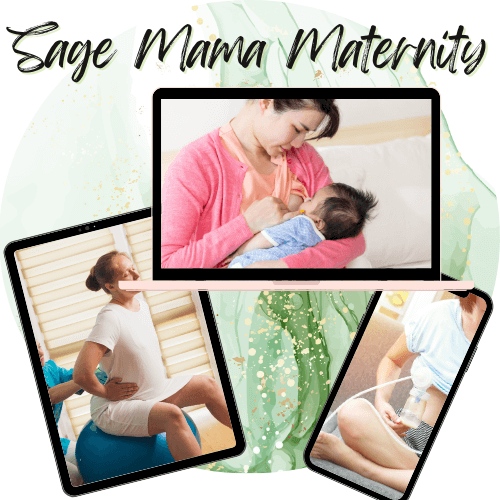 You're probably so excited about welcoming your baby into your home, if you're like most moms you're probably flipping through a few books, you've download some apps, and listening to your friend's and family's experience. You're probably doing your part to be a star patient for your doctor or midwife.
You're probably so excited about welcoming your baby into your home, if you're like most moms you're probably flipping through a few books, you've download some apps, and listening to your friend's and family's experience. You're probably doing your part to be a star patient for your doctor or midwife.I totally get that, and this is actually a problem because you're going to get you varied, sometimes conflicting advice that might not even work for your circumstance, and here is the kicker: lots of time's it not evidence-based guidance.
Instead of that, I want to offer you that working with a doula from your first trimester through your postpartum time is actually going to give you what you really need: cohesive information, expert guidance and the emotional support that every new mom deserves. It's like having an a doula in your pocket (or purse if that's where you keep your phone)
Hiring a Digital Doula is the best way to have a positive experience during your pregnancy, birth and postpartum. I would love to be your digital doula.
If you’ve ever searched “freezer stash,” you already know how many moms are stressed about it.
Alternatively, you may not know that while pumping can be an absolute blessing: it's a lot of work. Particularly exclusively pumping.
And if you’re an overachiever like me, maybe you’ve even thought, “Should I start pumping the same day I give birth?”
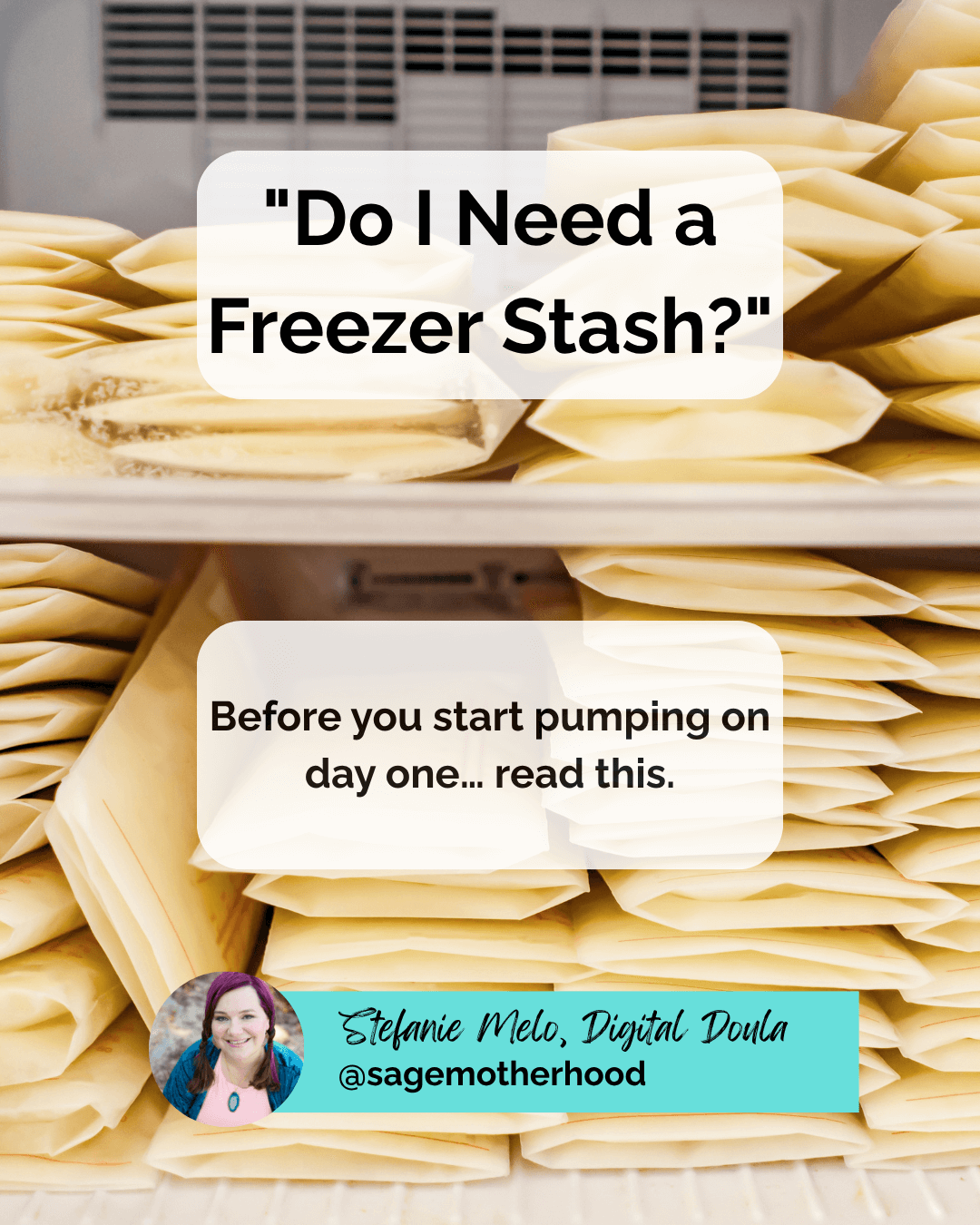
Here’s the truth:
Unless there’s a medical need, you likely don’t need to pump right away.
Even if you’re going back to work later, you have time.
Even if you’re going back to work later, you have time.
There are some exceptions—like if:
👶 Your baby is in the NICU
👅 Baby has palate or latch issues
🍼 Baby needs a feeding tube
📉 Baby loses more than 10% of birth weight and you need to boost supply
👶 Your baby is in the NICU
👅 Baby has palate or latch issues
🍼 Baby needs a feeding tube
📉 Baby loses more than 10% of birth weight and you need to boost supply
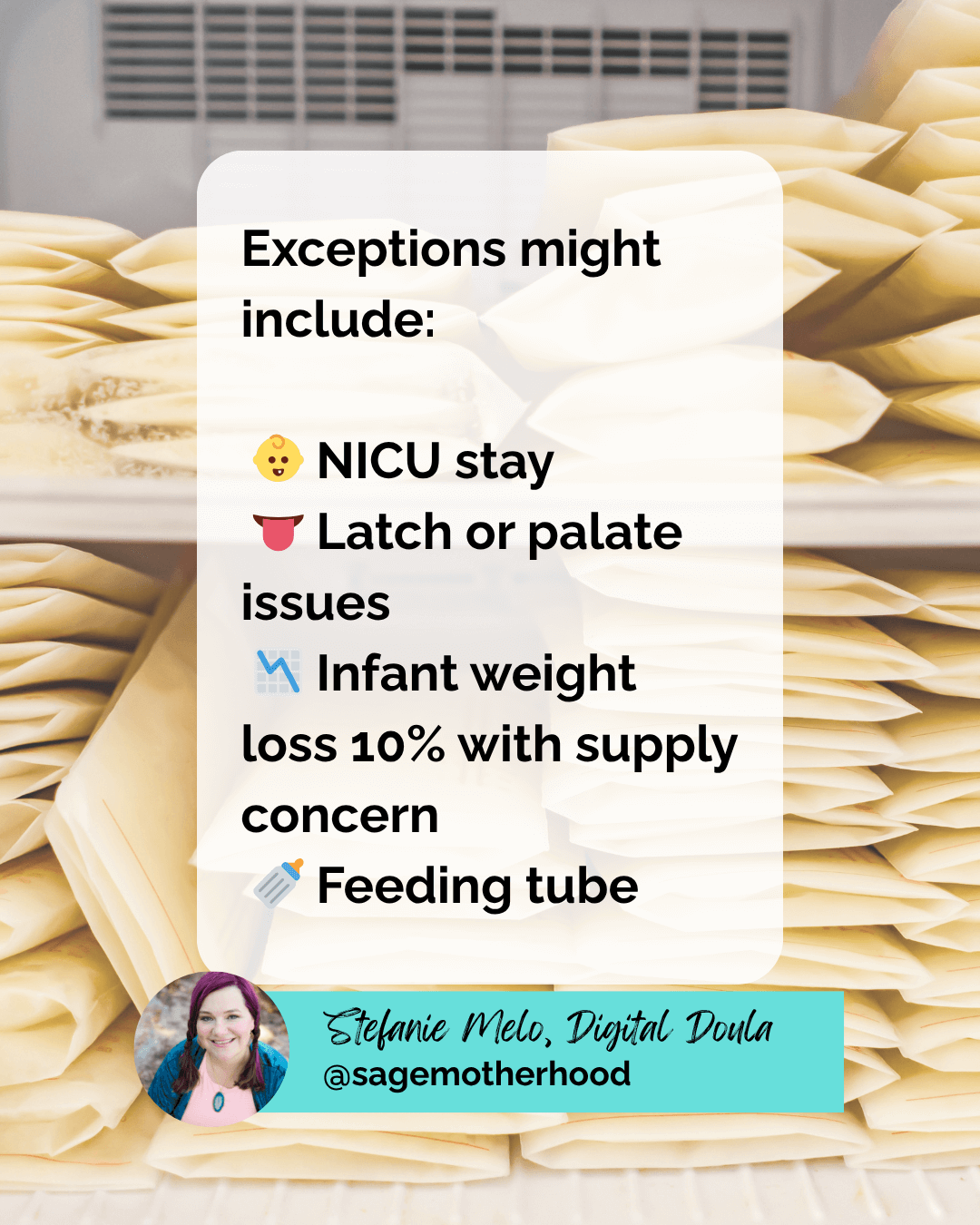
But if you’re focused on building a stash just for returning to work, pumping now can actually be counterproductive—to your mental health and bonding with your baby.
According to La Leche League:
👉 You only need about 3 days’ worth of milk for return-to-work
👉 Babies typically need 1 to 1.5 ounces per hour of separation
(That’s about 9–14 ounces for a full workday—not 32 or more!!)
👉 You only need about 3 days’ worth of milk for return-to-work
👉 Babies typically need 1 to 1.5 ounces per hour of separation
(That’s about 9–14 ounces for a full workday—not 32 or more!!)
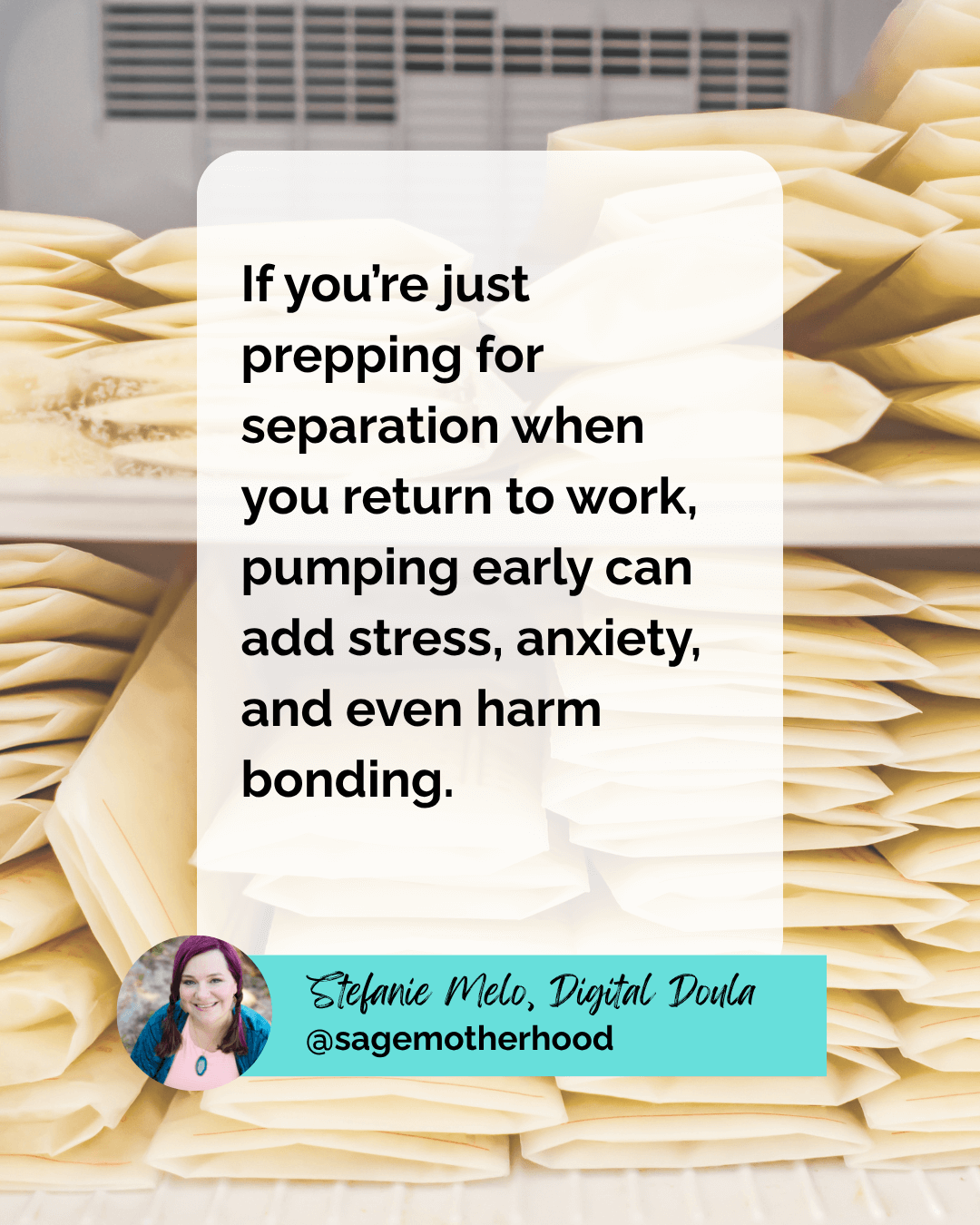
Smart hacks:
💡 Nurse baby at drop-off and pick-up
💡 Pump at work for the next day’s bottles
💡 Start freezing later when supply is steady and life is calmer
💡 Nurse baby at drop-off and pick-up
💡 Pump at work for the next day’s bottles
💡 Start freezing later when supply is steady and life is calmer
And here’s something really important:
Your baby needs colostrum now—not in 6 weeks.
Breast milk changes over time. Milk made for a 3-week-old is not the same as milk made for an 8-month-old.
So if no one has told you this yet, let me be the first:
You don’t need a deep freezer full of milk to be a great mom.
- You need rest.
- You two need to bond.
- You need confidence in your journey.
- You need evidence-based information.
- You deserve expert guidance to help you tune out the noise.
🌿 That’s exactly why I created Sage Mama Maternity—my all-trimester, full-spectrum Digital Doula program. So you’re not left guessing, Googling, or spinning with anxiety.
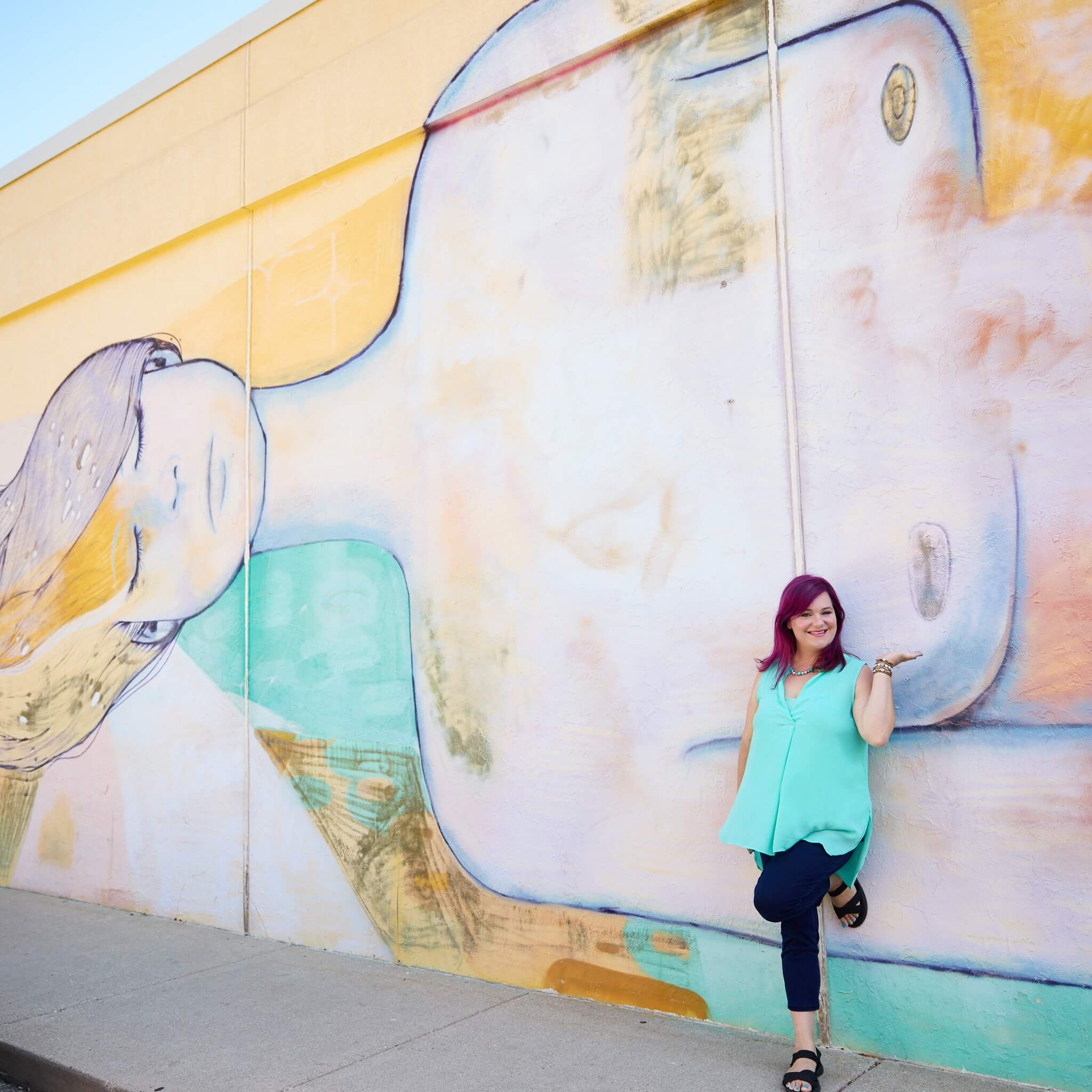
✨ Join the priority waitlist for Sage Mama Maternity, my complete education and personalized doula support program—designed for women who want a healthy, supported, and enjoyable pregnancy-to-postpartum experience.
You can do this. You don’t have to do it alone. 💛
 You're probably so excited about welcoming your baby into your home, if you're like most moms you're probably flipping through a few books, you've download some apps, and listening to your friend's and family's experience. You're probably doing your part to be a star patient for your doctor or midwife.
You're probably so excited about welcoming your baby into your home, if you're like most moms you're probably flipping through a few books, you've download some apps, and listening to your friend's and family's experience. You're probably doing your part to be a star patient for your doctor or midwife.I totally get that, and this is actually a problem because you're going to get you varied, sometimes conflicting advice that might not even work for your circumstance, and here is the kicker: lots of time's it not evidence-based guidance.
Instead of that, I want to offer you that working with a doula from your first trimester through your postpartum time is actually going to give you what you really need: cohesive information, expert guidance and the emotional support that every new mom deserves. It's like having an a doula in your pocket (or purse if that's where you keep your phone)
Hiring a Digital Doula is the best way to have a positive experience during your pregnancy, birth and postpartum. I would love to be your digital doula.

